The recent arrests in Sao Paulo, Brazil, of two individuals reportedly tied to Hezbollah has put the spotlight on the growing influence of Iran and Islamic regime-funded terrorist organizations such as Hezbollah in Latin America.
The two arrested individuals, who are now facing over 15 years in prison, were plotting to carry out terrorist attacks on Jewish community centers in Brazil, according to the Brazilian Federal Police. The Israeli government confirmed that its intelligence agency, the Mossad, aided Brazil in its efforts to stop the alleged plots.
For the past four decades, Iran has sought influence in Latin America with significant success in socialist-led countries such as Argentina, Bolivia, and Brazil, as well as the three authoritarian regimes in the region: Cuba, Venezuela, and Nicaragua.
Iranian President Ebrahim Raisi carried out a Latin American tour in June that saw him visit Cuba, Venezuela and Nicaragua, Iran’s closest allies in the region. During his encounter with Venezuelan socialist dictator Nicolás Maduro, Raisi asserted that Iran and Venezuela’s relation is of a “strategic” nature, with “common interests, views,” and “enemies” in a clear allusion to the United States.
The cooperation of the region’s leftist governments with Iran has, in turn, allowed the Iranian-funded Hezbollah and Hamas organizations not just to operate in the region, but to form alliances with local terrorist groups.
It is largely believed that Hezbollah, through Iran’s financial backing, was responsible for the bombing of the Argentine-Israeli Mutual Association (AMIA) headquarters in Buenos Aires on July 18, 1994. The attack, which killed 85 people, was the worst terrorist attack in the Western Hemisphere prior to the September 11, 2001, attacks.
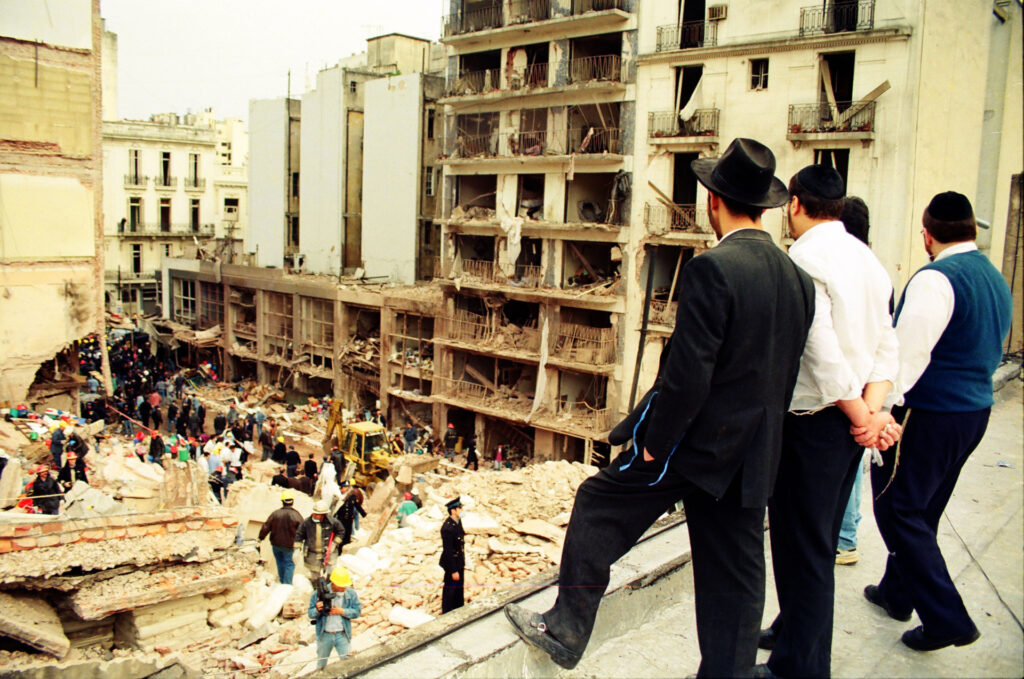
Jewish men, right, look on as rescuers sift through the rubble at the site of a car-bombing at the Asociacion Mutual Israelita Argentina (AMIA) Jewish Community Center in Buenos Aires, Argentina, on July 18, 1994. It was the biggest attack on a Jewish community outside Israel since World War II. The bombing killed 85 people and injured 300. (Diego Levy/Bloomberg via Getty)
Although Argentine authorities have documented evidence that ties the AMIA bombing attack to Iran and Hezbollah, no individual has yet been convicted.
In 2015, Argentine prosecutor Alberto Nisman was found dead of a gunshot wound in his residence hours before he was slated to give testimony to Congress as part of a case that accused leftist then-President Cristina Fernández de Kirchner of having helped cover up Iran’s involvement in the AMIA bombing, allegedly in exchange for beneficial trade deals with the Islamic regime. During the back-to-back presidencies of Fernández de Kirchner (2007-2015) and her late husband, Néstor Kirchner (2003-2007), Argentina fostered friendly relations with Iran.
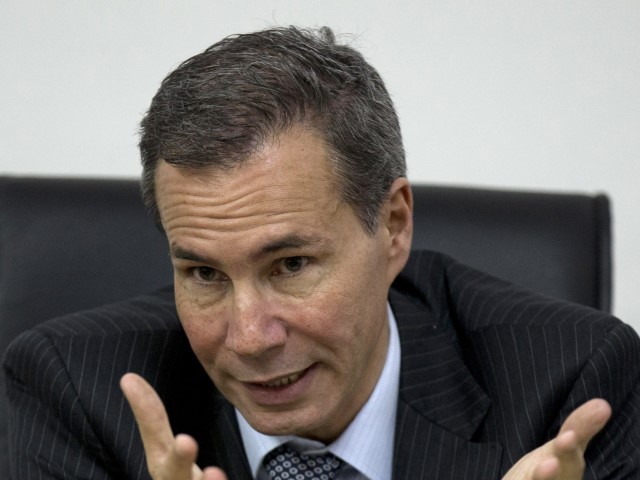
Alberto Nisman, the prosecutor investigating the 1994 bombing of the AMIA Jewish community center, talks to journalists in Buenos Aires, Argentina, Wednesday, May 29, 2013. Nisman accused Iran on Wednesday of infiltrating South American countries and installing a network that aims to carry out terrorist attacks in the region. (Natacha Pisarenko/AP)
Nisman’s death was ruled a suicide and the case against Fernández de Kirchner was controversially dismissed by an Argentine court in 2021. Fernández de Kirchner is currently serving as Argentina’s vice president until December 10, when the outgoing socialist presidency of Alberto Fernández (no relation) ends its term.
Two years before the AMIA bombing, the Israeli embassy in Argentina was the target of a suicide bombing attack that left 29 dead and 242 injured. The attack is also believed to have been orchestrated by Iran, using Hezbollah as its proxy.
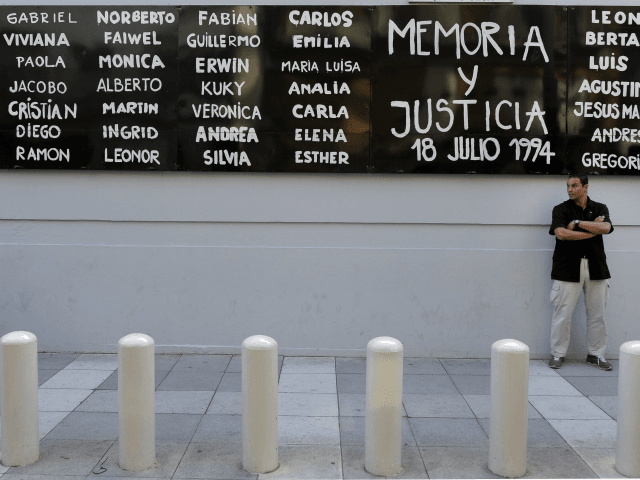
A man stands guard in front of the headquarters of AMIA (Argentine Israelite Mutual Association), in Buenos Aires on January 21, 2015, to protest against the death of Argentine public prosecutor Alberto Nisman, who was found shot dead earlier, just days after accusing President Cristina Kirchner of obstructing a probe into a 1994 Jewish center bombing. (ALEJANDRO PAGNI/AFP/Getty Images)
Last week, the executive director of the Center for a Secure Free Society (SFS) Joseph Humire described Iran’s influence in Bolivia as the Islamic regime’s “most successful project” in Latin America.
Humire stressed that Iran is not perceived as a relevant actor but “as a distant actor, and that is a fatal mistake.”
“Iran has been working on this project for 40 years, and it has already penetrated deeply into the region,” Humire told the Argentine news outlet Infobae last week. “This year they sent a warship, their president, and now they are showing their diplomatic muscle.”
He continued:
Iran has been very clear about its objectives since the arrival of the Ayatollahs to power, and knows that in order to advance in the Middle East and the world in general, its obstacle is the United States. In the region it is Israel, but globally it is the United States. And to hinder the United States they have to strengthen their capacity in Latin America.
Bolivia’s socialist government, led by President Luis Arce, signed a deal with Iran in July for the purchase of Iranian-made drones during the official visit of Bolivian Defense Minister Edmundo Novillo to Tehran, a trip that Novillo hoped will “pave the way for wide-ranging cooperation.”
Bolivia and Iran’s drone deal sparked concerns from both Argentina’s socialist government and the opposition alike due to the potential implications of growing Iranian influence in light of Iran’s past involvement in terrorist attacks against Argentina’s Jewish community.
Arce’s government cut all ties to Israel at the end of October, claiming Israel’s “disproportionate” ongoing operation against the Iranian-funded jihadist terrorist group Hamas as its reason.
Brazilian radical socialist President Luiz Inácio Lula da Silva, whose third presidential term began in January, has pursued improved ties with Iran throughout the year. In February, Lula allowed two Iranian warships to dock in Brazil, ignoring calls made by U.S. President Joe Biden, who urged him not to allow the ships to dock in Brazilian ports.
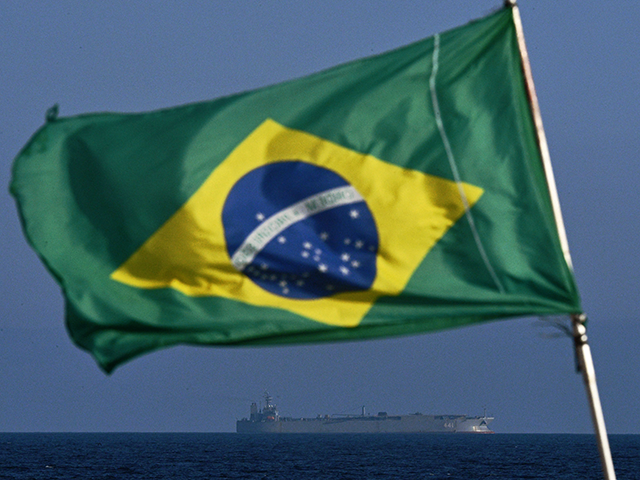
A Brazilian flag waves while the Iranian warship IRIS Makran sails on the coast of Rio de Janeiro, Brazil, on February 27, 2023. (CARL DE SOUZA/AFP via Getty)
The Iranian regime has not just been a historic ally of the socialist regime in Venezuela, but has been a crucial element in the continued rule of the Maduro regime following the collapse of socialism in the country.
Throughout 2023, Iran has assisted Venezuela in repairing the nation’s oil refineries after more than two decades of gross socialist mismanagement nearly destroyed all of Venezuela’s oil industry infrastructure. Iran has begun to refine its own oil in Venezuela’s repaired refineries and supply Venezuela with oil shipments when the socialist regime found itself unable to cover the nation’s own internal fuel demand.
The regimes signed a 20-year cooperation agreement in 2022. Iranian officials stated shortly afterwards that the Maduro regime had given away one million hectares of Venezuelan farmland to the Islamic regime for the cultivation of food.
The Maduro regime has been widely accused of providing Venezuelan passports to Hezbollah members, which allow Hezbollah to benefit from Venezuela’s visa waiver agreements with countries around the world and travel with more ease when compared to a Lebanese and/or Iranian passport.
Venezuela’s former Oil Minister and wanted drug lord Tareck El Aissami is believed to not just have direct ties to Hezbollah, but to be the terrorist organization’s biggest benefactor in Venezuela. El Aissami was stripped of his power within the socialist regime in March amidst an “anti-corruption” purge that began after $3 billion in oil revenue “disappeared” from the nation’s coffers. El Aissami has not been seen in public since, and the Maduro regime has not publicly issued any information on his whereabouts or revealed progress regarding the anti-corruption probe.
Cuba’s communist Castro regime has maintained friendly ties with Iran since the 1979 Islamic Revolution and, much as in Venezuela’s case, Iran has provided continued assistance to the Castro regime, more so after six decades of communist rule have left Cuba in ruins.
In 2003, the United States accused Cuba of jamming U.S. satellite communication feeds into Iran, an allegation the regime denied. Both Iran and Cuba are on the United States list of state sponsors of terrorism.
Similarly, Iran maintains strong cooperation ties with Nicaragua’s Sandinista Ortega regime as a result of their mutual anti-American stance.
Iran, through Hezbollah, has not only been able to foster Latin American influence at a government level, but also through local drug trafficking gangs and international narco-terrorism organizations such as Mexico’s Los Zetas and Sinaloa Cartels and Colombia’s Marxist Revolutionary Armed Forces of Colombia (FARC) terrorist organization.
Christian K. Caruzo is a Venezuelan writer and documents life under socialism. You can follow him on Twitter here.
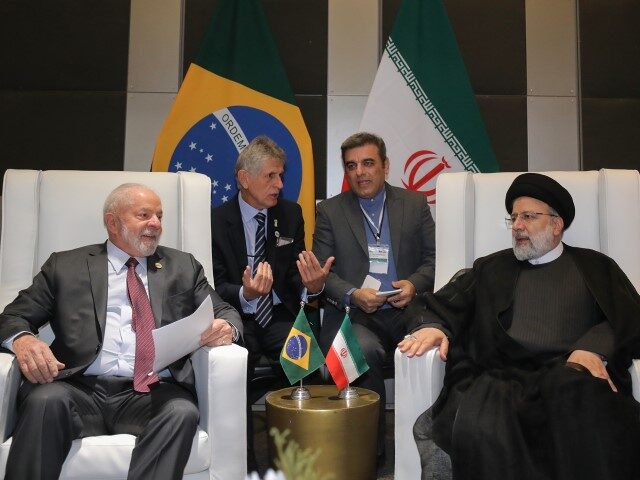
COMMENTS
Please let us know if you're having issues with commenting.